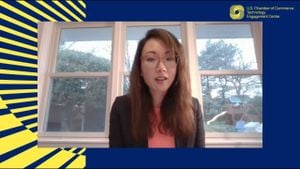Training journalists to effectively combat misinformation has become more pressing than ever, particularly as infectious diseases like Mpox emerge. Recently, journalists from Uganda's southwestern region gathered for intensive training to equip themselves with the knowledge needed to report accurately and help dispel myths surrounding the disease, which has seen rising cases across the country.
This training initiative was spearheaded by UNICEF and the World Health Organization (WHO), alongside the Uganda Ministry of Health, with implementation handled by the African Center for Media Excellence. Taking place at Lake View Resort Hotel, the program responded to the alarming trend of Mpox misinformation, as Uganda reported at least 26 confirmed cases to date.
Jackson Kadumye, Senior Communications Officer at the Uganda Ministry of Health, emphasized during the training the importance of informed journalism. He pointed out, "Some members of the public have developed false perceptions of Mpox, believing it to be linked to witchcraft. Some even seek treatment from witch doctors, which is both dangerous and misguided. The media must step up to correct this misinformation."
Reporters were trained to identify early symptoms of Mpox—such as skin rashes and fever—and to communicate these signs clearly to the public. Ensuring the media successfully conveys this information could motivate individuals to seek appropriate medical attention swiftly. "If the media can clearly communicate these symptoms to the public," Kadumye stated, "we believe it will help people recognize the disease and take protective measures."
Philemon Kabagambe, WHO Uganda’s Field Coordinator, reinforced the need for accuracy and objectivity, stating, "Accurate and balanced reporting is key. We need to prevent unnecessary panic among the public by ensuring the information shared is grounded in facts, not rumors." Covers of preventive measures were also discussed, with journalists encouraged to disseminate practical guidance to their audiences.
Emmanuel Ainebyona, the Spokesperson for the Uganda Ministry of Health, urged participants to internalize the training's lessons: "This training is intended to guide you to educate the public to make informed choices. Do not take it for granted." The urgency of this training could not be overstated; as Mpox cases increase, journalists find themselves on the front lines of public health education, tasked with not just reporting but actively shaping community knowledge and response.
The efforts reflected here extend beyond Uganda. Across the African continent, journalists are being trained to tackle misinformation more broadly. The Ghana Journalists Association has also taken steps to address misinformation, particularly as the country gears up for electoral processes. Their recent training initiative was part of the Advanced Course on Disinformation and Fact-Checking during the Election Process, aimed at equipping journalists to debunk false narratives as they arise.
Albert Dwumfour, President of the Ghana Journalists Association, stressed the necessity of maintaining standards, advising stakeholders involved with elections to stay clear of journalists if they cannot handle scrutiny: "Stay away from journalists if you don’t have the temperament to accommodate them," he warned. His comments echo the sentiment of many media professionals who recognize the role they play as gatekeepers of information.
The training, conducted by CASA Africa and supported by Spanish media outlets, emphasized the need for journalists to be vigilant against disinformation, as it threatens democracy. Mr. Joan Tusell Prats, representing CASA Africa, commented on the significance of this struggle against misinformation, noting, "Disinformation, misinformation, and the need to fact-check information have become worldwide issues."
With upcoming elections slated for December, the urgency for accurate reporting grows stronger. Training sessions included various topics focused on identifying disinformation tactics and developing practical skills for fact-checking. Participants were guided through case studies and tools curated for the local media environment, aiming to refine their ability to spot and counter false narratives.
This detailed approach reflects the recognition by organizations like CASA Africa of the rewards of investing time and resources to forge well-informed media professionals. They aim to share successful experiences and methodologies from Spain to bolster the skills of African journalists.
The recent surge of initiatives supporting journalists is not strictly confined to Uganda and Ghana, as financial literacy also finds its way onto the agenda. Old Mutual Group recently organized training sessions for Kenyan journalists to boost their financial literacy reporting. The event, supported by research from the Old Mutual Financial Services Monitor, revealed alarming gaps—like limited access to savings and poor debt management—faced by many Kenyans.
Dr. Isaac Nzyoka, Group COO of Old Mutual East Africa, highlighted the significant role media can play: “Media play a pivotal role in democratizing financial education. We aim to inspire positive financial changes across the country." By equipping journalists with sound financial knowledge, the organization seeks to increase public awareness around this pressing issue and guide Kenyans toward making informed financial decisions.
At these training sessions, journalists are not merely passive recipients of knowledge; they become agents of change within their communities by delivering valuable information directly to the public. Old Mutual’s focus on financial resilience aligns with similar platforms across the continent, fostering knowledgeable and proactive journalism.
The empowerment of journalists through such comprehensive training programs transcends the mere spread of information. It prepares them to engage with communities thoughtfully and critically, ensuring their reports do not add fuel to misinformation fires but quench them instead.
While these efforts attempt to create systemic change around misinformation and reporting standards, the rapidly changing media landscapes across many nations continue to challenge traditional reporting practices. The increasing reach of social media platforms amplifies the potential for misinformation to spread unchecked, raising stakes higher for professional journalists.
Facebook, Twitter, and other platforms are fraught with misleading information, often circulating faster than verified reports can be published. Consequently, training sessions like those held by UNICEF and WHO, directed at addressing health misinformation, or those organized by GJA, geared toward tackling electoral disinformation, showcase the urgent need for fortified media capacities across all sectors.
These initiatives represent broader movements among countries within Africa aiming to strengthen public health awareness, combat misinformation, and promote responsible journalism practices. The interconnectedness of education and media integrity is becoming more pronounced, as journalists undertake pivotal roles in determining community perceptions of health, finance, and democracy.
For the journalists stepping up to these challenges, their work may not only change individual lives but also improve the overall quality of discourse and democratization efforts throughout their nations. Empowered journalists can lead to healthier communities, more financially literate citizens, and informed electorates ready to engage positively with their democratic processes.
These collective strides toward journalism training and empowerment resonate as hopeful signs of progress. Journalists armed with the right knowledge possess the potential to not only influence their immediate environments but to create ripple effects throughout their societies by challenging misconceptions and fostering evidence-based narratives.



